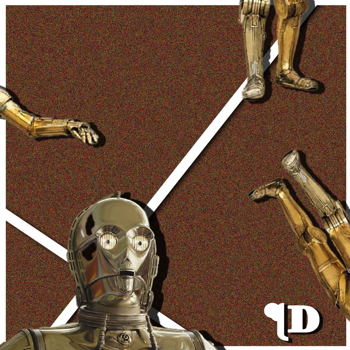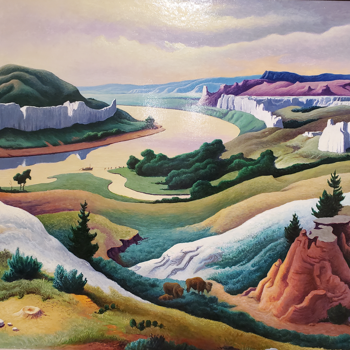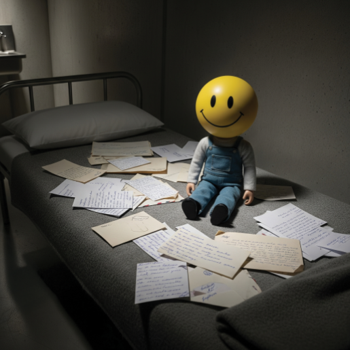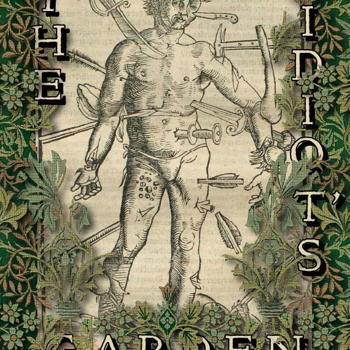Eyen of her Mynde
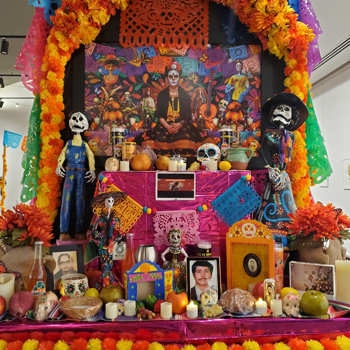 Artwork by Parker Wilson
Artwork by Parker Wilson
She is on the hill, Iphigenia, overlooking the water. She wears her robes light white cotton, the material pleating from the sea’s breeze that pushes up the cliff wall, catching air in eroded pockets of rocks that then explode with energy, gusts of sea air.
Her father stands beside her, a large man. He has a patch of red hairs on each hand illuminated by the scorching sun. He tugs at the tuft on his left hand before raising the hatchet. Yes, her head will feed the gods of war and we will win, Iphigenia in her white flowing robes as if she is already a ghost. What is wrong with a father who sacrifices a daughter like Lot in the mountains? My father is dead. I live in the mountains.
The images of tombstones, names deeply carved, years as if those rivulets of impression from the stone maker can possibly capture time—my father, my father—I am running through the grass the stones a blur pale gray like fog I honestly can’t see much but my legs skinny, my knees bare, the freckle on my calf that spreads out like a tiny orange star, my anklets are white, my shoes red. I can’t stop running. Daddy, Daddy.
We buried Daddy today. It is almost dark now. I have come back to that spot where the two men lowered him in a giant mahogany box that seemed coated in what I have seen on my grandmother’s nails, translucent but glimmering when the light hits, drops of bubbles gathering when water touches her hands.
There are streets in the cemetery. I was led to the spot in a black limousine. I sat in the back, my hands enfolded one upon the other, the pearls Daddy had put around my neck before he died, the soft blue coat almost the color of the stones standing on these mazes of paths. Daddy, Daddy, where are you?
The light gets dimmer. The old lamps go on automatically. They look like flickering candles are burning inside. They cast yellow light.
The grass is damp. I smell it. I smell the dirt.
I find my father. He is one of the few that has no headstone. There is a lump of mottled earth beside a tarp. There is a shovel. It is the shovel that was used at noonday to heap in piles of earth to say goodbye.
I lie on the grass and gently lift the cover hiding my father. Is it his box? I am not sure without a name, without a face, without a time frame. Daddy, I whisper.
I move my hands through the grass to find pebbles. I gather them in my palms and fling them at my father. Wake up wake up wake up. I press my eyelids together. I pray. “My God who is in Heaven. Give me my father. He is not yours.” God doesn’t listen. Daddy sleeps, if it is Daddy. I don’t know. I can’t see him.
I hear my name called. I see the double lights of a car. I hear the rhythm of Miss Safridos’ heels against the pathway.
“You are an orphan now,” Miss Safridos says. “Your father worried about that.”
I lie still. I stretch out on the grass. I crawl like the first snake wiggling my way flat as I can towards the hole and drop inside.
I want to open the box. “Pandora,” someone whispers. Is it the trees? I press my fingertips into the crevice between top and bottom. There is barely room to move.
Dirt walls are a perfect fit for the box. I am on top and even if it could be opened, my weight, as light as I am, would hold it down.
I see lights approaching. I hear footsteps. It is not only Miss Safridos’ now. There is a group like on the night of the saints. They hold torches. They shine flashlights that make moon shapes of white with haloes. They will find me soon.
I just lie very still on top of Daddy’s box. The wood is so hard. Inside, there is a soft, cream-colored cushion all around him and a matching sheet on top. At first, someone had covered his face, but I folded the sheet back to see him, to make sure his picture transferred into my eyes, a permanent portrait, one with that smile of delight when he saw me, opening his mouth wide and his cheeks puffing out and his blue eyes holding me.
Mom is here in my mind. She is forlorn. Her thick hair is shredded like strings of meat. She, too, has the pearls from Dad and hers are so luminescent as she is not a real figure but an imaginary one like one of those saints I’ve seen in a picture book.
When she sees me, she cries. She opens her arms and I climb out. But it is Miss Safridos. She says, “Come here, baby. You’ll be my little one, you feral creature.” She’s always calling me a feral creature as if I am a tiger or bear.
My dress and coat, my shoes and socks, my flesh is covered in red earth. I wonder if any living creatures are within the layers of dirt, ants perhaps, or roots of flowers. Usually my father would be angry if I dirtied my clothes, but not today. He, too, is covered in earth though protected by that shiny box that looks like polished fingernails.
Miss Safridos hugs me so tightly we are both submerged in red earth and, perhaps, ants, the roots of flowers.
She sings “Hush little baby, don’t say a word, Papa’s gonna buy you a mockingbird.”
I see my father again. I see my mother, still beautiful, rocking me in her arms. We connect with our eyes. It is as if there is a tunnel of light particles between us. I see the steel cage that looks like a structure in the Botanical Gardens and there is my singing mockingbird. He won’t stop singing.
The house is on a hill. There are houses on both sides of the narrow road. There are walls of stone before each residence. Behind the stone walls, there are gardens; roses encircle a pond. The water is almost silver from the light that reflects off the mountains. There is a bench carved with pelicans and herons with fish hanging from their beaks.
When I look down, there are lakes and streams and always geese flying. Across the way, clear from the pinnacle where the bodies are laid to rest, are the mountains, layer upon layer, blues and grays stretching across the skies like frayed ribbons illuminated by sun or moon, soaking up color.
The house has oak floors, wide planks of cherry wood that fit unevenly. When they are walked on, the wood moves as if it is a living thing.
I am not afraid of night creatures. I welcome ghosts. They allow people to be forever present and I am not one for endings. Each night, I climb out my bedroom window. It is on the first floor and faces the back of the house and even when Miss Safridos sees me she holds her fingers to her lips letting me know she is in on my secret.
Miss Safridos never sleeps. She lives alone in her cottage since I can remember. She takes in stray animals like Muffin, the dog with three legs and one eye shut with what looks like dried glue from my arts and crafts class. She has a noisy seagull, Gypsy, whose wings were cut off by her nephew, “the Juvenile Delinquent,” who spent years inside a home for violent boys. His name is Hernando and he has so many tattoos unadorned skin is no longer visible. He has giant rattlesnakes and the open mouths of growling tigers with sharp teeth that come alive when he moves. He even carved his girlfriend’s name in his forearm with a pocketknife. It got infected and looks very much like the shut eye of Miss Safridos dog, a raw pink with yellow guck and swelling. He says the swelling makes him look stronger. His arm is disproportionately large. I think he looks like a madman: that painted, infected flesh, his unwashed hair that curls over his brows, tar-colored eyes that have almost no white around the iris so they appear as an abyss of burning coals.
Miss Safridos also takes care of the abandoned dog, Lupo, whose family had to flee to South America to avoid creditors. She has lots of cats. She has birds that alight upon her shoulders where she places sunflower seeds. She says the seeds help the birds sing. It is the singing she loves so much, sad like dirges in the church.
She has never removed her black clothes following the deaths of her parents. She should have died, too, the three of them on a sleigh ─ a freak cold spell her first time seeing snow ─ that her father could not stop until it fell right into the river at the hill’s bottom and both her parents got pneumonia. She still remembered the heat coming from their foreheads, scorching. She was able to warm herself within their hot bodies.
Miss Safridos cooked herbs that she grew in her garden. She boiled fruits from the fruit trees, lemons and oranges and mangoes. She made jams pouring the liquids into heated jars and shutting closed, lining the shelves with the colorful preserves.
Whenever I passed in the night, she would hand me some warm soda bread that filled the air with the smell of yeast with her sweet jam inside all wrapped in silver foil and a piece of string as if it were a small package.
Sometimes I spent entire nights sleeping next to my father and I swear I’d feel the heat of his body warming the earth for me, softening the blades of grass so that it was as if I were floating in air, me, the feral child, wild as a raccoon with those same eyes outlined in black.
Before the sun rises, I return home not long before it is time to go off to school. I walk down the hill and sit near the lake like a giant crater. It seems to collect the entire village in its reflective waters. I watch the orange fish glide just below the surface like petals of tulips sprinkled with iridescence. The blue heron stands erect, its protruding beak searching for a fish and the groups of vultures that sit on the trees like sentinels.
After Dad dies, the vultures proliferate. They are in the trees. They line the lakes. They sit on stones in the streams. The vultures cover the Spanish clay tiles of Miss Safridos’ roof. They line the frames of her windows. They sit along the rock walls. Hernando comes with his sling shot and suddenly there is a rush of feathers, puffs of blackness and up they’d go and then descend and Hernando runs quickly into his aunt’s house, locks the doors, closes the shutters, and hooks them tight.
“They pick at us until we’re all bones,” said Miss Safridos. “Then your bones become pure white like a seashell bleached by sun. Bones dry out and crumble just like sand.”
Hernando follows me to the cemetery. “Let’s dig him up. Your father. You know Mrs. Veronesi. She stuffed her dog after he died. You can see him through the window. He scares ghosts away.”
“I like ghosts. Mr. Ansettio has an entire jungle of dead animals. He’s a taxidermist. He works for a museum and puts the animals on display in boxes with plants and birds and water made of blue reflecting glass. When I visit him and touch the animals, I feel like they’re talking to me. Their fur feels warm.”
“Can we bring your father to Mr. Ansettio?”
“You’re weird. I don’t want a stuffed dead father. I visit him here and I have my photos. He’s in my eyes; his voice is in my ears.”
“Okay,” says Hernando.
The next night, I go to visit my father. I hear the squeak of Hernando’s sneakers. It sounds like he’s walking on water. “I want to protect you from the spirits,” he says.
“Your aunt, Miss Safridos, speaks to dead people all the time. She lights all those cinnamon candles and holds onto that cross built from crate planks, the one with that little jesus man with holes in his hands and thorns in his head like a monster.”
“Saying that, you’ll be cursed.”
“Go home, Hernando.”
I sit on the grass beside the hole that cradles my father. I sit there and hold my breath. I wait to hear from him. When the leaves blow against one another I wonder if Dad is whispering to me. I try to shape letters from the sounds. I take the imagined letters and link them together like those dolls I make folding one piece of paper many times and then cutting out the shape of a little girl. When I unfold the paper there are many girls holding hands like the letters making lines, giving me a message from my father.
Miss Safridos is in her house and it is like a lantern in the distance. She is praying for me. She is praying that my father will blow out the word love so that I might finally know he has protected me with his breath as if I am preserved in polyurethane, able to keep rot out. He doesn’t want me in his abyss.
“Not without you,” Hernando says disrupting my thoughts. So we walk back to his aunt’s house.
She is waiting. Her door is open. She is sitting cross-legged before the fireplace. The table is covered with candles of different sizes and different scents. First I smell peppermint ─ “keeps the spirits calm” ─ then rose that she made herself from the petals in the garden. It smells too sweet and makes me cough.
“You can stay with me now, feral child,” Miss Safridos says.
“Why do you always call me that?”
“Your daddy raised you best he could, but without a Mama. I always looked out for you, though, brought you food, made sure you were bathed and prayed for you and your dad.”
“I guess it didn’t help, my dad, I mean.”
“Oh, yes, espiritu de las montanas, they comfort him now. They will help him sleep and you, too. I made you and Hernando my favorite pistachio bread with lilac petals.”“It’s so green,” I said. “I don’t like green food.”
“It’s delicious,” said Miss Safridos. “Open your mouth. C’mon.” Miss Safridos leaned her face into mine. She was so close, her face blurred. She took her fingers and pressed into my cheeks until my lips parted and then pushed a piece of green cake inside my mouth.
“Now have some of my dandelion tea. I just gathered the plant today from the garden. It’s hot and I added some honey.”
When I drank it all, the honey remained on the bottom and I stuck my tongue in the cup as far as I could hoping to taste it.
“We do have spoons, you know,” she said. “This is going to be complicated. You’re too young to be alone.”
“I want to stay in my father’s house.”
“The Children’s Protection Agency will come for you, little one. They’ll put you in a place with lots of kids until someone wants you to be theirs. You won’t see us anymore.”
“I’m not going.”
I left and walked back to the cemetery. I would stay with my father. He would protect me. The light from Ms. Sofridos’ house guided me.
I dig a space for myself. I use a rock. The space is shallow and the shape of a half-egg. After awhile, the chill of the night air seems to become warmer, then hot. I dream I am in the tropics beneath a coconut tree with the truck swaying in a wind. The rains come during the night. Some water remains in my little sleeping cove. My clothes are dripping with water. I am warm and tired. I say good morning to Father and fall asleep once more. The birds gather around me, singing, and I feel the rough tongue of Miss Safridos’ cat. I am too tired to open my eyes. It is good. I see my father.
We are in the sea during low tide. We peel mussels off the jutted rock formations.
Dad’s metal pail is full and he stuffs some of the mussels in his swimsuit pocket. We run to shore as the tide comes in. Soon the rocks are submerged. Dad grabs me as I approach the land or I, too, would be submerged among the rocks, dragged out, my head banging against the rocks only to drown. Dad would try to rescue me but sometimes a body just sinks below the water’s surface and is unseen for days unless a wave throws them back. Sometimes the bodies just tumble the way I have seen dead fish, the way I last saw my mother.
I could not reach her. Neither could father. I lost my father when I lost my mother. He tried to come back but never fully did. That’s when we moved. That’s when Miss Safridos began to care for us.
We moved away so we could forget, forget the ocean and the sea creatures and the smell of salt and fog. We left for the mountains.
The house we bought smelled too sweet. It smelled like the lilac bush, like the perfume that the women at the battery factory used to douse their unwashed bodies to disguise the smell of sweat, the rot of vegetables too long on a shelf. The house smelled like all growing things had gathered their scents together to fill our space. Time was evaporating. Father appeared like light, pastel colors almost translucent.
How long was he transitioning? How difficult was it for him to leave?
I am soaking in the tub. It’s one of those antique tubs as deep as a small pool. My father balances precariously on the curved rim. He fears I will drown like my mother.
“What are you doing?” asks Miss Safridos who has entered the house. She waves her hands at him as if he is a pesky insect. “A girl needs her private space.”
Father slowly rises, reaches for his cane that leans against the sink. It is silver with the head of a lion. There are raised lines of silver for the lion’s mane. He looks at us.
“There is so much water,” he says. “She’s so small.”
Miss Safridos makes her special face where she twists her lips as if there is a pipe balanced between them. She puts her hands on her hips and expands her chest.
“Drowning,” she says, “is not a genetic disease nor is it something that someone would try to learn to do.”
Dad limps out of the room. “Maybe later,” he says to us both, “you can show me the new dress Miss Safridos made for you. I laid it out on your bed. “
“Okay, Daddy,” I say. After the bath, I put on the dress. Miss Safridos loves pearl buttons and I need her to close the back, each button fitting into a small circle of thread, twenty in all. The dress is soft and glimmers in certain light as if it is made of many colors buried beneath pale gray. The sleeves are short and cupped, a small band that squeezes my arms. The skirt is loose so I can run.
As Dad requests, I strut through the house like a model making a pathway between tables and chairs. I suck in my cheeks like the models I’ve seen in magazines. Miss Safridos has applied pink and peach to my face from powdered colors she keeps in jars. She uses a thin brush for the cheek bones, a thicker one for beneath the bone where she puts a deeper color to create shadow. She dots my lips with red. Miss Safridos says she once worked in the local theater as a makeup artist, so she is used to transforming little girls into Lolitas. “Who is Lolita?” I ask and she tells me a little girl in a make believe book that I am too young to read. Dad doesn’t like the reference. I see his scowl. Miss Safridos kisses my father on the cheek. Does she love my father?
“You can go now,” he says.
“I’m going,” she says.
Father says, “Would you like to sing ‘Where Have All the Flowers Gone?’”
He likes sad songs. “Daddy, that’s about everyone dying.”
“How about, ‘When you walk through a storm hold your head up high.’ Your mom used to sing that. She was like a nightingale. You don’t want to sing? We can read parts of Hamlet together? Here, I have that skeleton head from our Halloween celebration. “He hath borne me on his back a thousand times.” Dad holds out the skeleton as if it is Shakespeare’s Yorick. “Don’t cry,” he says to me, but I see myself on my father’s back when I was smaller and how he had me hold on to him tightly when we dove in and out of waves, how he held me while we ran on the beach or that night when mother died and he sucked me into his arms like a giant sheet blocking out the world. I am too big to carry now and these are just memories. Dad is dead. He has crossed into the mirror world. My hand reaches out to touch the silver surface. Dad is in there living like mist and here he is, too, beneath the newly tossed dirt, the green plastic that covers the earth that hasn’t yet coagulated. I lie beside him. I know Miss Safridos is waiting for me. When I open my eyes, I see the lights from her home are still on. Even the smells of incense, cinnamon, vanilla, like a delicious dessert, waft up the hill and drift into my nasal passages. It is enough to sustain me. I miss my father’s love. I am sorry for his sadness.

